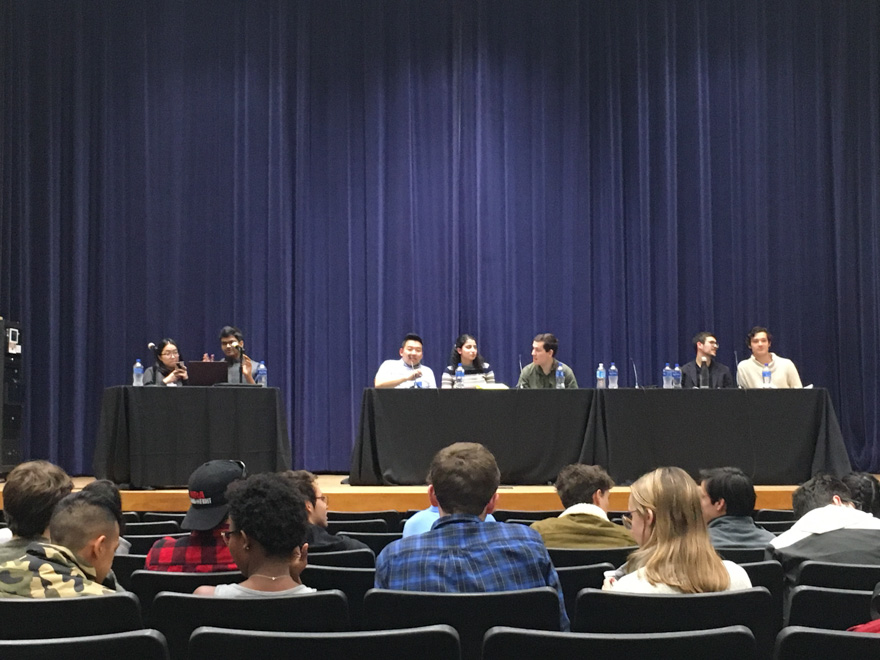On Thursday, six student panelists discussed whether universities have the right to ban campus guest speakers considered hateful for their views at a panel-debate entitled “Who Deserves to Speak?”
Stanford in Government (SIG) hosted and moderated the panel months after the Stanford College Republicans invited “counter-jihadist” Robert Spencer to speak on campus in November, a decision that sparked controversy.
“I assumed that there would be a majority perspective on campus on this issue, but there isn’t,” said Bryce Tuttle ’20, co-director of SIG’s Public Policy Form Committee. “This is really an issue where people are divided.”
The panel featured students representing various positions in the debate: Terence Zhao ’19, an op-ed columnist for The Stanford Daily and co-director of Diversity and Outreach for SIG; Jana Kholy ’20, a co-organizer of the protest against Spencer’s talk in November; Caleb Smith ’17, who circulated a petition calling on the ASSU to withdraw support and funding from Spencer’s event; Melissa Loupeda ’21, a member of Stanford Women in Politics; Alp Akis ’21, a writer for The Stanford Review; and Quinn Barry ’21, a member of the Stanford College Republicans. SIG members Kasha Akrami ’21 and Ngoc Vo ’21 moderated the discussion.
The debate began with one-minute opening speeches from each panelist. Zhao said that he believes speakers like Robert Spencer should be banned from speaking on college campuses, especially if countries like the United Kingdom have deemed them a national “security threat.”
“The question [of] whether this man is dangerous has already been settled,” Zhao said. “We have to draw a reasonable line between what is educational, what is conducive and what is simply dangerous.”
Kholy echoed Zhao, arguing that panelists should consider to whom universities ought to give a platform.
“Everyone has a limit when it comes to free speech,” Kholy said.
She cited Milo Yannipaulous’s resignation from Breitbart due to his comments on pedophilia as an example of this: Even Breitbart, known for its inflammatory views, drew the line at Yannipaulous’ remarks, she said.
“Free speech is never an absolute,” she reiterated.
The rest of the panelists held contrary views, with Loupeda arguing that the benefits of bringing speakers to campus who hold views that might be deemed hate speech outweigh the drawbacks.
“When we have a controversial speaker on campus, we’re able to partake in difficult conversations that we would not have the opportunity to do otherwise,” Loupeda said. “We’re able to hold speakers accountable to what they say and subject them to public judgment and opinion.”
Smith, Akis and Barry agreed with Loupeda, with Barry adding that choosing to ban some kinds of speech in private academic institutions contradicts a commitment that students should expect institutions to uphold: a duty to educate their students.
“If [universities] want any claim to being a legitimate academic institution that wants to … educate their students, then they need to be committed to the free exchange of ideas,” he said.
Still, speech that incites violence should also not be allowed, Barry added.
While Zhao and Kholy declined to specifically define where the line on allowable speech should be drawn at college campuses, Kholy suggested that institutions should not invite speakers who target “systematically oppressed groups” to speak to their students.
“[Universities] have to uphold the dignities of [their] students,” she argued.
Throughout the debate, Smith held the position that free speech should be respected — but with one important nuance.
“There’s a distinction to be made between University funds and student government funds,” he said. “I would suggest when it comes to the expenditure of student government funds, our student government should adhere to a basic test of ‘we should treat all speakers with equal respect who essentially respect the equality of Stanford students.’”
The moderators of the discussion quickly opened the debate to audience participation, seeing that two audience members were raising their hands even prior to the debate’s close.
One audience member asked the panelists what they thought was the “ideal” student response when speakers known for hate speech are invited to campus.
Loupeda answered that students’ divided response to Robert Spencer’s arrival to campus was the ideal response: The event drove students to protest, sign a petition against Spencer’s coming to campus and hold conversations about free speech both in person and through student publications.
The observation echoed a point that Loupeda made earlier in the debate with regard to the measures that the University takes to prevent events from escalating to violence — for example, making events exclusive to students to keep out “outside agitators.”
“Robert Spencer came on campus, and we’re still here,” she said.
Another audience member directed a series of questions at Akis, asking Akis to clarify what he meant by saying that speakers who actively call for violence should be banned. The audience member queried whether Akis considered speech that inspires violence as equivalent to a call for violence.
“That’s on people,” Akis replied.
Speech that directly correlates with violence should be banned, but a racial slur is not a call to violence, he added.
Though the organizers of the debate encouraged panelists and audience members to “keep an open mind” before the debate, some audience members left the debate still staunch in the views that they came with.
“I think it would have been productive if there were fewer people,” suggested Kamil Aftyka ’21.
He also said he wishes that the panelists had been pushed to consider their “fundamental values” and “preconceived beliefs” — such as society’s relationship to religion and what our obligations to the community should be — more explicitly.
“That would have challenged the participants of the debate to think more introspectively about where their beliefs come from,” Aftyka said.
Contact Eliane Mitchell at elianem ‘at’ stanford.edu.
